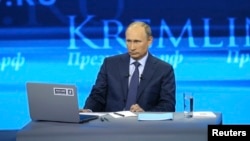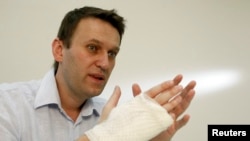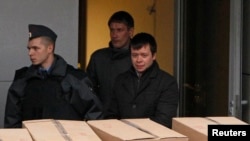MOSCOW —
President Vladimir Putin rejected comparisons with Soviet dictator Josef Stalin on Thursday in his annual televised question-and-answer session with citizens, denying political persecution but saying Russia needed order and discipline.
A liberal journalist referred to a host of legal sanctions applied to Putin's opponents since he was re-elected president to ask him whether there were elements of Stalinism in his exercise of power.
But on a day when the first Russian civic group was fined under a new law intended to limit foreign influence, an opposition activist was jailed over an anti-government protest and another was being tried for fraud, Putin dismissed the idea.
“I don't see any elements of Stalinism here,” he said. “Stalinism is linked to the cult of personality, massive legal violations, repressions and labor camps. There is nothing like that in Russia and I hope there never will be again. But this does not mean that we should not have order and discipline.”
Putin, a former KGB officer who has mixed praise of some of Stalin's achievements with criticism of his harsh methods, denied using the courts to persecute opponents - a hallmark of Stalin's three decades in power until his death in 1953.
“Nobody is putting anyone behind bars for their political views,” Putin said.
Fraud charges
Protest leader and anti-corruption campaigner Alexei Navalny, arguably Putin's most formidable political opponent in the absence of any effective parliamentary opposition, says his trial on charges of defrauding a timber firm has been trumped up to silence him.
Avoiding using Navalny's name, but clearly referring to him, Putin said: “People who fight corruption must be pure as crystal themselves, otherwise it [their campaigning] all looks like self-promotion and political advertising.”
Navalny's supporters have compared his trial to that of former oil tycoon Mikhail Khodorkovsky, who was jailed in 2005 on fraud and tax evasion charges after falling out with Putin and remains in prison.
Putin's remarks in a confident live appearance that lasted nearly five hours indicated he has no plans to ease the pressure on opponents and activists that has helped stifle what were the biggest opposition protests since he came to power in 2000.
The human rights campaign groups Amnesty International and Human Rights Watch this week said Putin's new term had seen a witch-hunt against dissenters and the toughest crackdown on civil society since the Soviet era.
Protesters on trial
A Moscow court on Thursday convicted opposition activist Konstantin Lebedev of organizing mass disorder at a protest on May 6 last year, the eve of Putin's inauguration, and sentenced him to two-and-a-half years in prison.
He was given lenient treatment because he implicated others, which lawyers fear could bode ill for prominent opposition leader Sergei Udaltsov and more than 20 others who have also been formally accused or charged in connection with the May 6 protest. One other person has been convicted.
Also on Thursday, a Moscow court handed a 300,000 rouble ($9,500) fine to Golos, a vote-monitoring group that documented fraud allegations in the presidential election and a 2011 parliamentary election, for declining to register as a “foreign agent” under a new law aimed at NGOs with foreign funding.
For many Russians, that designation clearly evokes the Stalin era. Golos said the foreign payment in question had been a human rights prize, which it had promptly returned in full.
Putin dismissed criticism of the law, saying: “Let them say where they got money, how much, and how they have spent it.”
He also referred disparagingly to Pussy Riot, the female band, some of whose members were jailed for singing a raucous anti-Putin song near the altar of Moscow's main Orthodox cathedral.
“These girls from Pussy Riot and guys who desecrate the graves of our soldiers must be equal before the law,” he said.
A liberal journalist referred to a host of legal sanctions applied to Putin's opponents since he was re-elected president to ask him whether there were elements of Stalinism in his exercise of power.
But on a day when the first Russian civic group was fined under a new law intended to limit foreign influence, an opposition activist was jailed over an anti-government protest and another was being tried for fraud, Putin dismissed the idea.
“I don't see any elements of Stalinism here,” he said. “Stalinism is linked to the cult of personality, massive legal violations, repressions and labor camps. There is nothing like that in Russia and I hope there never will be again. But this does not mean that we should not have order and discipline.”
Putin, a former KGB officer who has mixed praise of some of Stalin's achievements with criticism of his harsh methods, denied using the courts to persecute opponents - a hallmark of Stalin's three decades in power until his death in 1953.
“Nobody is putting anyone behind bars for their political views,” Putin said.
Fraud charges
Protest leader and anti-corruption campaigner Alexei Navalny, arguably Putin's most formidable political opponent in the absence of any effective parliamentary opposition, says his trial on charges of defrauding a timber firm has been trumped up to silence him.
Avoiding using Navalny's name, but clearly referring to him, Putin said: “People who fight corruption must be pure as crystal themselves, otherwise it [their campaigning] all looks like self-promotion and political advertising.”
Navalny's supporters have compared his trial to that of former oil tycoon Mikhail Khodorkovsky, who was jailed in 2005 on fraud and tax evasion charges after falling out with Putin and remains in prison.
Putin's remarks in a confident live appearance that lasted nearly five hours indicated he has no plans to ease the pressure on opponents and activists that has helped stifle what were the biggest opposition protests since he came to power in 2000.
The human rights campaign groups Amnesty International and Human Rights Watch this week said Putin's new term had seen a witch-hunt against dissenters and the toughest crackdown on civil society since the Soviet era.
Protesters on trial
A Moscow court on Thursday convicted opposition activist Konstantin Lebedev of organizing mass disorder at a protest on May 6 last year, the eve of Putin's inauguration, and sentenced him to two-and-a-half years in prison.
He was given lenient treatment because he implicated others, which lawyers fear could bode ill for prominent opposition leader Sergei Udaltsov and more than 20 others who have also been formally accused or charged in connection with the May 6 protest. One other person has been convicted.
Also on Thursday, a Moscow court handed a 300,000 rouble ($9,500) fine to Golos, a vote-monitoring group that documented fraud allegations in the presidential election and a 2011 parliamentary election, for declining to register as a “foreign agent” under a new law aimed at NGOs with foreign funding.
For many Russians, that designation clearly evokes the Stalin era. Golos said the foreign payment in question had been a human rights prize, which it had promptly returned in full.
Putin dismissed criticism of the law, saying: “Let them say where they got money, how much, and how they have spent it.”
He also referred disparagingly to Pussy Riot, the female band, some of whose members were jailed for singing a raucous anti-Putin song near the altar of Moscow's main Orthodox cathedral.
“These girls from Pussy Riot and guys who desecrate the graves of our soldiers must be equal before the law,” he said.







